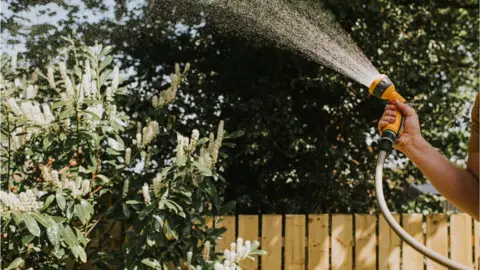Thames Water hosepipe ban comes into force in England
 Getty Images
Getty ImagesA hosepipe ban affecting millions of people has come into force in parts of southern England.
The ban was imposed by Thames Water from 00:01 BST on Wednesday and applies to 10 million customers across the Thames Valley and London.
People will not be able to use hosepipes to water gardens, wash cars and windows, or fill paddling pools.
The decision was announced earlier this month after reports of the River Thames reaching its lowest level since 2005.
Those found to have breached the rules could be fined up to £1,000.
Similar measures have been implemented by other water companies across Hampshire and the Isle of Wight, Kent and Sussex, following the driest July since 1935.
Thames Water CEO Sarah Bentley previously said implementing the ban had been a "very difficult decision" but, she added, reservoir storage levels in London and Farmoor in Oxfordshire had "reduced significantly".

It is not yet known how long the ban will last. Thames Water said it would depend on the weather and promised customers would be kept informed.
"We need prolonged and significant rainfall. We'll be monitoring our water levels carefully," the company said.
The ban is the next phase in the water firm's drought plan, having already announced it was currently fixing 1,100 leaks across its 20,000-mile network every week.
The firm previously admitted it "must do better" after coming under fire for having the worst record on leaks out of all nine water companies in England.

Tom Edwards, BBC London Environment Correspondent
The temporary use ban restricts the use of hosepipes but it only cuts demand for water by about 5%.
It is seen as a very blunt instrument with lots of exemptions - for example Thames Water say you can use your hosepipe in an allotment but not a garden.
You can also water new trees with a hosepipe for 28 days and sports pitches if it'll affect their "commercial viability".
And while Thames Water has introduced a ban across the Thames Valley and the parts of London it covers, the capital's other operators Affinity and SES Water say a ban is "unlikely".
They use aquifers - underwater rocks that store water - more than Thames Water and levels there have held up a bit better.
All water companies say customers should use water wisely.
And this problem isn't going away. Experts say due to climate change, the industry will have to improve its leakage rates considerably, build new reservoirs and persuade us all to use much less water.

Resident Hannah Nicholson, who lives in Cranleigh, near Guildford, claimed the hosepipe ban came as several water leaks in the village were reported to Thames Water.
She said she wanted the company to "take water leaks seriously and deal with it".
"The water is running down the road and they are going to limit the water through hosepipes... I am angry, I am upset," she said.
In a statement, Thames Water said it was "not acceptable to be losing so much precious water" but added that rectifying the problem "would not be quick".
The company said 60,000 leaks were fixed last year, adding: "We are repairing over 1,100 leaks per week, whether they are visible or hidden below ground."
 Getty Images
Getty ImagesThe GMB union said Thames Water's daily waste was the equivalent of one person having a hosepipe on every day for 73 years.
"You could have had a hosepipe on constantly since before the Queen was on the throne and you still wouldn't have used as much as Thames Water wastes in 24 hours," a spokesperson said.
The union said last year Thames Water handed its directors more than £4m, with the highest paid director receiving £1.5m - up 67% from the year before.
Hosepipe bans have recently come into effect in several parts of England as temperatures topped 40C in the UK for the first time on record this summer.

Follow BBC South on Facebook, Twitter, or Instagram. Send your story ideas to south.newsonline@bbc.co.uk.
